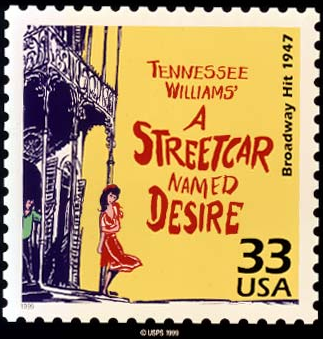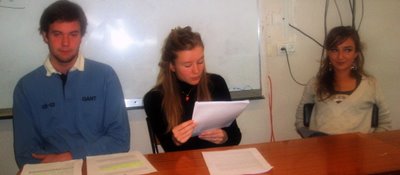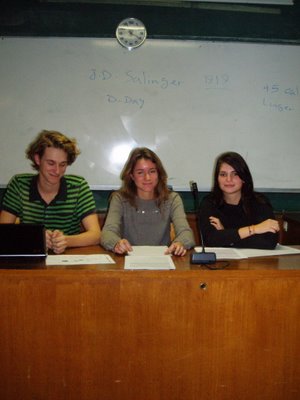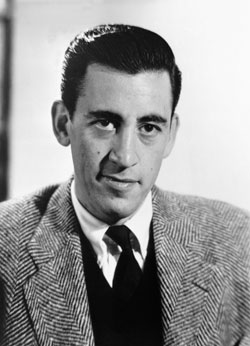
31 December 2006
21 December 2006
Tennessee Williams, 1911 - 1983

Don't look forward to the day you stop suffering, because when it comes you'll know you're dead.
I didn't go to the moon, I went much further-for time is the longest distance between two places.
Hell is yourself and the only redemption is when a person puts himself aside to feel deeply for another person.
Luxury is the wolf at the door and its fangs are the vanities and conceits germinated by success. When an artist learns this, he knows where the danger is.
Security is a kind of death.
When so many are lonely as seem to be lonely, it would be inexcusably selfish to be lonely alone.
Turn that off! I won't be looked at in this merciless glare! A Streetcar Named Desire
Blanch: I don't want realism.
Mitch: Naw, I guess not.
Blanch: I'll tell you what I want. Magic! A Streetcar Named Desire
I have always depended on the kindness of strangers. A Streetcar Named Desire (1947)
What is the victory of a cat on a hot tin roof?-I wish I knew...Just staying on it, I guess, as long as she can.Cat on a Hot Tin Roof
Make voyages! - Attempt them! - there's nothing else... Camino Real
Brick: Well, they say nature hates a vacuum, Big Daddy.
Big Daddy: That's what they say, but sometimes I think that a vacuum is a hell of a lot better than some of the stuff that nature replaces it with. Cat on a Hot Tin Roof (1955)
Everyone says he's sincere, but everyone isn't sincere. If everyone was sincere who says he's sincere there wouldn't be half so many insincere ones in the world and there would be lots, lots, lots more really sincere ones!
We have to distrust each other. It's our only defence against betrayal.Camino Real
18 December 2006
The alafaco of the matter is

Last week was fine. Had a few interesting discussions during the class with my usually wakeful students. This is what keeps the teacher going, a few bright eyes gleaming with intelligence here and there in a sea of faces looking up to you for knowledge and wisdom, or perhaps at the clock above your head. Hard to know which.
Discussed a very challenging poem by William Carlos Williams called "To Waken An Old Lady". The poem is about old age; the pain and inglorious state of growing old and also the richness of experience and memory that is part of its package.
Attended the annual end of the year supper with my students and other colleagues from FACO (see the photos below). It is a rewarding experience to get together with the students in an informal relaxed setting and listen to them telling you about their hopes and dreams for the future. It makes an old teacher feel part of a continuity, and contributing to a chain of renewable energies. It is a good way to welcome the new year.
How to Land on your Feet in the American Literature Exam

1) Read the handout on Practical Criticism.
2) Choose one poem we have discussed during the course and prepare at least three questions about its content.
3) Choose a piece of prose ( short story, play or essay) we have discussed during the course and prepare at least three questions about its content.
4) Make sure your diary is up to date and bring it with you to the exam.
16 December 2006
Roundtables
15 December 2006
14 December 2006
13 December 2006
Garrison Keillor, born August 7 1942
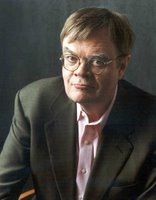
May 30, 2006
There is no monument like a book
Memorial Day is a fading holiday, destined to go the way of the Glorious Fourth and Labor Day, which once had ceremonial functions and now are simply bonus Saturdays. It was a small-town institution and a matter of community pride to honor our dead. The citizenry hiked up to the cemetery on Monday morning behind the VFW honor guard and listened to a speech and sang "America the Beautiful" and stood for a rifle salute and "Taps," and then walked quietly home. It's easier to organize this sort of thing in a town of 2,000 than in a city of a million, so it has faded, a victim of urbanization. And also because the speeches were not so good. And because we are young restless people, not old weepy people.
Americans aren't good at memorials. In the wake of President Kennedy's death, his name was attached to many things, including Idlewild Airport in New York and Cape Canaveral in Florida, but naming things isn't the same as remembering. The memorial airport - Kennedy, LaGuardia, Reagan, George Bush, John Wayne, General Edward Logan, General Billy Mitchell - is an odd notion. Airports are beehives. You get your ticket, go through security, get coffee, go to the gate, wait, board, and at what point do you stop to consider the World War II heroism of Navy flyer Butch O'Hare?
Likewise, the memorial freeway. A freeway is a strip of pockmarked concrete on which the uglier aspects of human nature are played out every day. You would not want the name of anyone you care for put on such a place.
A memorial is where the memory of a person is made manifest, such as Emily Dickinson's quiet house and garden in Amherst, or the restored Lincoln neighborhood in Springfield, or Hyde Park. Or the Civil War battlefields, which are faithfully maintained and staffed with knowledgeable guides. A three-hour visit can transport you back to 1863. The National Bohemian Historic Sites of Greenwich Village and San Francisco are there to be seen, the ghosts of E.E. Cummings and Edna St. Vincent Millay and Allen Ginsberg and Jerry Garcia. William Faulkner's house in Oxford, Mississippi. The list goes on.
But why the enormous lump that is Grant's Tomb? And Mount Rushmore? After you've driven the length of South Dakota, four faces carved from rock is not the thrill it ought to be. Add Ronald Reagan's face to it, grinning and winking, and liven up the place. And when will we put a stop to the tradition of the Imperial Presidential Library/Showroom & Temple? Lincoln was one who was worthy of a temple, but his memorial is a cold gloomy cavern. We should take the roof off and let the sun stream in and the rains pour down. It would look better as a ruin.
Anyway, there is no need for a stone memorial to honor the man who wrote "of the people, by the people, for the people" and "With malice toward none; with charity for all; with firmness in the right, as God gives us to see the right, let us strive on to finish the work we are in; to bind up the nation's wounds; to care for him who shall have borne the battle, and for his widow, and his orphan - to do all which may achieve and cherish a just and lasting peace, among ourselves, and with all nations." He wrote those words himself, sitting at a small desk upstairs in the White House, back at a time when presidents did that. Lincoln lives in the beautiful one-volume Library of America edition of his writings.
No writer needs a memorial. The family of E.B. White decided after he died that the farm in Maine where he wrote his books should not be turned into a museum. If you want to find him, you simply read the essay, "The Death of a Pig," or "Charlotte's Web" or "Here Is New York."
In New York they are trying to figure out how to honor the men and women who went down in the twin towers. Well, the best memorial yet is a lovely book, "102 Minutes." You can visit it anywhere, and it means more than a wall of names, or a reflecting pool. Those people live on in the book, which is about large and small acts of heroism and kindness in the face of death, and you can't say that with stones or reflecting pools. You need words.
© 2006 by Garrison Keillor. All rights reserved. Distributed by Tribune Media Services, INC.
Woody Allen, 1935-

Everybody says that comedy is harder to do. That's become a truism by now, but it's wrong. Comedy is not harder.The hardest thing is to do good work, whatever it is.
Eighty percent of success is showing up.
Eternal nothingness is fine if you happen to be dressed for it.
When I was kidnapped, my parents snapped into action.They rented out my room.
His lack of education is more than compensated for by his keenly developed moral bankruptcy.
How is it possible to find meaning in a finite world, given my waist and shirt size?
I am at two with nature.
I don't want to achieve immortality through my work... I want to achieve it through not dying.
I tended to place my wife under a pedestal.
I took a speed reading course and read 'War and Peace' in twenty minutes. It involves Russia.
I was thrown out of college for cheating on the metaphysics exam; I looked into the soul of the boy sitting next to me.
I'm astounded by people who want to 'know' the universe when it's hard enough to find your way around Chinatown.
If it turns out that there is a God, I don't think that he's evil. But the worst that you can say about him is that basically he's an underachiever.
If only God would give me some clear sign! Like making a large deposit in my name in a Swiss bank.
Interestingly, according to modern astronomers, space is finite. This is a very comforting thought-- particularly for people who can never remember where they have left things.
Life is divided into the horrible and the miserable.
Life is full of misery, loneliness, and suffering - and it's all over much too soon.
Money is better than poverty, if only for financial reasons.
Most of the time I don't have much fun. The rest of the time I don't have any fun at all.
My education was dismal. I went to a series of schools for mentally disturbed teachers.
My one regret in life is that I am not someone else.
Organized crime in America takes in over forty billion dollars a year and spends very little on office supplies.
11 December 2006
American Literature Through Journalism
07 December 2006
First Year Alafaco Roundtable
Second Year Alafaco Roundtable
06 December 2006
Toni Morrison, 1931 -

• Tell us what it is to be a woman so that we may know what it is to be a man. What moves at the margin. What it is to have no home in this place. To be set adrift from the one you knew. What it is to live at the edge of towns that cannot bear your company. (Nobel Lecture, 1993)
• The ability of writers to imagine what is not the self, to familiarize the strange and mystify the familiar, is the test of their power.
• I really think the range of emotions and perceptions I have had access to as a black person and as a female person are greater than those of people who are neither.... So it seems to me that my world did not shrink because I was a black female writer. It just got bigger.
• When I write, I don't translate for white readers.... Dostoevski wrote for a Russian audience, but we're able to read him. If I'm specific, and I don't overexplain, then anyone can overhear me.
• When there is pain, there are no words. All pain is the same.
• If there is a book you really want to read but it hasn’t been written yet, then you must write it. (speech)
• What difference do it make if the thing you scared of is real or not? (from Song of Solomon)
• I think women dwell quite a bit on the duress under which they work, on how hard it is just to do it at all. We are traditionally rather proud of ourselves for having slipped creative work in there between the domestic chores and obligations. I'm not sure we deserve such big A-pluses for all that. (from Newsweek interview, 1981)
• If you're going to hold someone down you're going to have to hold on by the other end of the chain. You are confined by your own repression.
• I'm a Midwesterner, and everyone in Ohio is excited. I'm also a New Yorker, and a New Jerseyan, and an American, plus I'm an African-American, and a woman. I know it seems like I'm spreading like algae when I put it this way, but I'd like to think of the prize being distributed to these regions and nations and races. (Nobel Lecture, 1993)
• In Tar Baby, the classic concept of the individual with a solid, coherent identity is eschewed for a model of identity which sees the individual as a kaleidoscope of heterogeneous impulses and desires, constructed from multiple forms of interaction with the world as a play of difference that cannot be completely comprehended.
*Becoming an American is based on an attitude: an exclusion of me.
*Black literature is taught as sociology, as tolerance, not as a serious, rigorous art form.
*Everything I've ever done, in the writing world, has been to expand articulation, rather than to close it.
*I don't write -ist novels.
*I learned an enormous amount of self-esteem, even though the collapse of the relationship suggested the opposite. I just had to stand up.
*I would solve a lot of literary problems just thinking about a character in the subway, where you can't do anything anyway.
*I'm not entangled in shaping my work according to other people's views of how I should have done it.
*It makes me breathless to be told that this is difficult writing-that nobody in the schools is going to want to talk about all of these issues.
*Make a difference about something other than yourselves.
William Carlos Williams, 1883 - 1963

To Waken an Old Lady
Old age is
a flight of small
cheeping birds
skimming
bare trees
above a snow glaze.
Gaining and failing
they are buffeted
by a dark wind --
But what?
On harsh weedstalks
the flock has rested --
the snow
is covered with broken
seedhusks
and the wind tempered
with a shrill
piping of plenty.
To Waken An Old Lady waken=to rouse from inactivity; stir up or excite; arouse; awaken
Old age is
a flight of small flight=A group, especially of birds or aircraft, flying together, flock.
cheeping birds = A faint, shrill sound like that of a young bird; a chirp.
skimming = to pass or glide lightly over or near a surface
bare trees
above a snow glaze. glaze=A thin glassy coating of ice
Gaining and failing gaining=To become fast
they are buffeted buffet=batter
by a dark wind --
But what?
On harsh weedstalks stalk=A stem or similar structure that supports a plant part such as a flower, flower cluster, or leaf
the flock has rested --
the snow
is covered with broken
seedhusks husk=the dry external covering of certain fruits or seeds, esp. of an ear of corn
and the wind tempered temper=to soften or tone down
with a shrill shrill=Sharp or keen to the senses; harshly vivid
piping of plenty piping=characterized by the peaceful music of the pipe plenty=a full or abundant supply or amount
01 December 2006
Sherwood Anderson, 1876 - 1941

Hands
Upon the half decayed veranda of a small frame house that stood near the edge of a ravine near the town of Winesburg, Ohio, a fat little old man walked nervously up and down. Across a long field that had been seeded for clover but that had produced only a dense crop of yellow mustard weeds, he could see the public highway along which went a wagon filled with berry pickers returning from the fields. The berry pickers, youths and maidens, laughed and shouted boisterously. A boy clad in a blue shirt leaped from the wagon and attempted to drag after him one of the maidens, who screamed and protested shrilly. The feet of the boy in the road kicked up a cloud of dust that floated across the face of the departing sun. Over the long field came a thin girlish voice. "Oh, you Wing Biddlebaum, comb your hair, it's falling into your eyes," commanded the voice to the man, who was bald and whose nervous little hands fiddled about the bare white forehead as though arranging a mass of tangled locks.
Wing Biddlebaum, forever frightened and beset by a ghostly band of doubts, did not think of himself as in any way a part of the life of the town where he had lived for twenty years. Among all the people of Winesburg but one had come close to him. With George Willard, son of Tom Willard, the proprietor of the New Willard House, he had formed something like a friendship. George Willard was the reporter on the Winesburg Eagle and sometimes in the evenings he walked out along the highway to Wing Biddlebaum's house. Now as the old man walked up and down on the veranda, his hands moving nervously about, he was hoping that George Willard would come and spend the evening with him. After the wagon containing the berry pickers had passed, he went across the field through the tall mustard weeds and climbing a rail fence peered anxiously along the road to the town. For a moment he stood thus, rubbing his hands together and looking up and down the road, and then, fear overcoming him, ran back to walk again upon the porch on his own house.
In the presence of George Willard, Wing Biddlebaum, who for twenty years had been the town mystery, lost something of his timidity, and his shadowy personality, submerged in a sea of doubts, came forth to look at the world. With the young reporter at his side, he ventured in the light of day into Main Street or strode up and down on the rickety front porch of his own house, talking excitedly. The voice that had been low and trembling became shrill and loud. The bent figure straightened. With a kind of wriggle, like a fish returned to the brook by the fisherman, Biddlebaum the silent began to talk, striving to put into words the ideas that had been accumulated by his mind during long years of silence.
Wing Biddlebaum talked much with his hands. The slender expressive fingers, forever active, forever striving to conceal themselves in his pockets or behind his back, came forth and became the piston rods of his machinery of expression.
The story of Wing Biddlebaum is a story of hands. Their restless activity, like unto the beating of the wings of an imprisoned bird, had given him his name. Some obscure poet of the town had thought of it. The hands alarmed their owner. He wanted to keep them hidden away and looked with amazement at the quiet inexpressive hands of other men who worked beside him in the fields, or passed, driving sleepy teams on country roads.
When he talked to George Willard, Wing Biddlebaum closed his fists and beat with them upon a table or on the walls of his house. The action made him more comfortable. If the desire to talk came to him when the two were walking in the fields, he sought out a stump or the top board of a fence and with his hands pounding busily talked with renewed ease.
The story of Wing Biddlebaum's hands is worth a book in itself. Sympathetically set forth it would tap many strange, beautiful qualities in obscure men. It is a job for a poet. In Winesburg the hands had attracted attention merely because of their activity. With them Wing Biddlebaum had picked as high as a hundred and forty quarts of strawberries in a day. They became his distinguishing feature, the source of his fame. Also they made more grotesque an already grotesque and elusive individuality. Winesburg was proud of the hands of Wing Biddlebaum in the same spirit in which it was proud of Banker White's new stone house and Wesley Moyer's bay stallion, Tony Tip, that had won the two-fifteen trot at the fall races in Cleveland.
As for George Willard, he had many times wanted to ask about the hands. At times an almost overwhelming curiosity had taken hold of him. He felt that there must be a reason for their strange activity and their inclination to keep hidden away and only a growing respect for Wing Biddlebaum kept him from blurting out the questions that were often in his mind.
Once he had been on the point of asking. The two were walking in the fields on a summer afternoon and had stopped to sit upon a grassy bank. All afternoon Wing Biddlebaum had talked as one inspired. By a fence he had stopped and beating like a giant woodpecker upon the top board had shouted at George Willard, condemning his tendency to be too much influenced by the people about him, "You are destroying yourself," he cried. "You have the inclination to be alone and to dream and you are afraid of dreams. You want to be like others in town here. You hear them talk and you try to imitate them."
On the grassy bank Wing Biddlebaum had tried again to drive his point home. His voice became soft and reminiscent, and with a sigh of contentment he launched into a long rambling talk, speaking as one lost in a dream.
Out of the dream Wing Biddlebaum made a picture for George Willard. In the picture men lived again in a kind of pastoral golden age. Across a green open country came clean-limbed young men, some afoot, some mounted upon horses. In crowds the young men came to gather about the feet of an old man who sat beneath a tree in a tiny garden and who talked to them.
Wing Biddlebaum became wholly inspired. For once he forgot the hands. Slowly they stole forth and lay upon George Willard's shoulders. Something new and bold came into the voice that talked. "You must try to forget all you have learned," said the old man. "You must begin to dream. From this time on you must shut your ears to the roaring of the voices."
Pausing in his speech, Wing Biddlebaum looked long and earnestly at George Willard. His eyes glowed. Again he raised the hands to caress the boy and then a look of horror swept over his face.
With a convulsive movement of his body, Wing Biddlebaum sprang to his feet and thrust his hands deep into his trousers pockets. Tears came to his eyes. "I must be getting along home. I can talk no more with you," he said nervously.
Without looking back, the old man had hurried down the hillside and across a meadow, leaving George Willard perplexed and frightened upon the grassy slope. With a shiver of dread the boy arose and went along the road toward town. "I'll not ask him about his hands," he thought, touched by the memory of the terror he had seen in the man's eyes. "There's something wrong, but I don't want to know what it is. His hands have something to do with his fear of me and of everyone."
And George Willard was right. Let us look briefly into the story of the hands. Perhaps our talking of them will arouse the poet who will tell the hidden wonder story of the influence for which the hands were but fluttering pennants of promise.
In his youth Wing Biddlebaum had been a school teacher in a town in Pennsylvania. He was not then known as Wing Biddlebaum, but went by the less euphonic name of Adolph Myers. As Adolph Myers he was much loved by the boys of his school.
Adolph Myers was meant by nature to be a teacher of youth. He was one of those rare, little-understood men who rule by a power so gentle that it passes as a lovable weakness. In their feeling for the boys under their charge such men are not unlike the finer sort of women in their love of men.
And yet that is but crudely stated. It needs the poet there. With the boys of his school, Adolph Myers had walked in the evening or had sat talking until dusk upon the schoolhouse steps lost in a kind of dream. Here and there went his hands, caressing the shoulders of the boys, playing about the tousled heads. As he talked his voice became soft and musical. There was a caress in that also. In a way the voice and the hands, the stroking of the shoulders and the touching of the hair were a part of the schoolmaster's effort to carry a dream into the young minds. By the caress that was in his fingers he expressed himself. He was one of those men in whom the force that creates life is diffused, not centralized. Under the caress of his hands doubt and disbelief went out of the minds of the boys and they began also to dream.
And then the tragedy. A half-witted boy of the school became enamored of the young master. In his bed at night he imagined unspeakable things and in the morning went forth to tell his dreams as facts. Strange, hideous accusations fell from his loose-hung lips. Through the Pennsylvania town went a shiver. Hidden, shadowy doubts that had been in men's minds concerning Adolph Myers were galvanized into beliefs.
The tragedy did not linger. Trembling lads were jerked out of bed and questioned. "He put his arms about me," said one. "His fingers were always playing in my hair," said another.
One afternoon a man of the town, Henry Bradford, who kept a saloon, came to the schoolhouse door. Calling Adolph Myers into the school yard he began to beat him with his fists. As his hard knuckles beat down into the frightened face of the schoolmaster, his wrath became more and more terrible. Screaming with dismay, the children ran here and there like disturbed insects. "I'll teach you to put your hands on my boy, you beast," roared the saloon keeper, who, tired of beating the master, had begun to kick him about the yard.
Adolph Myers was driven from the Pennsylvania town in the night. With lanterns in their hands a dozen men came to the door of the house where he lived alone and commanded that he dress and come forth. It was raining and one of the men had a rope in his hands. They had intended to hang the schoolmaster, but something in his figure, so small, white, and pitiful, touched their hearts and they let him escape. As he ran away into the darkness they repented of their weakness and ran after him, swearing and throwing sticks and great balls of soft mud at the figure that screamed and ran faster and faster into the darkness.
For twenty years Adolph Myers had lived alone in Winesburg. He was but forty but looked sixty-five. The name of Biddlebaum he got from a box of goods seen at a freight station as he hurried through an eastern Ohio town. He had an aunt in Winesburg, a black-toothed old woman who raised chickens, and with her he lived until she died. He had been ill for a year after the experience in Pennsylvania, and after his recovery worked as a day laborer in the fields, going timidly about and striving to conceal his hands. Although he did not understand what had happened he felt that the hands must be to blame. Again and again the fathers of the boys had talked of the hands. "Keep your hands to yourself," the saloon keeper had roared, dancing, with fury in the schoolhouse yard.
Upon the veranda of his house by the ravine, Wing Biddlebaum continued to walk up and down until the sun had disappeared and the road beyond the field was lost in the grey shadows. Going into his house he cut slices of bread and spread honey upon them. When the rumble of the evening train that took away the express cars loaded with the day's harvest of berries had passed and restored the silence of the summer night, he went again to walk upon the veranda. In the darkness he could not see the hands and they became quiet. Although he still hungered for the presence of the boy, who was the medium through which he expressed his love of man, the hunger became again a part of his loneliness and his waiting. Lighting a lamp, Wing Biddlebaum washed the few dishes soiled by his simple meal and, setting up a folding cot by the screen door that led to the porch, prepared to undress for the night. A few stray white bread crumbs lay on the cleanly washed floor by the table; putting the lamp upon a low stool he began to pick up the crumbs, carrying them to his mouth one by one with unbelievable rapidity. In the dense blotch of light beneath the table, the kneeling figure looked like a priest engaged in some service of his church. The nervous expressive fingers, flashing in and out of the light, might well have been mistaken for the fingers of the devotee going swiftly through decade after decade of his rosary.
Round Table First Year, November 30
29 November 2006
Jerome David Salinger, 1919 - 2010

“You take somebody that cries their goddam eyes out over phoney stuff in the movies, and nine times out of ten they're mean bastards at heart.”
"I hate phonies."
"She is the queen of the phonies."
"I'm sick of not having the courage to be an absolute nobody."
"Among other things, you'll find that you're not the first person who was ever confused and frightened and even sickened by human behaviour. You're by no means alone on that score, you'll be excited and stimulated to know. Many, many men have been just as troubled morally and spiritually as you are right now. Happily, some of them kept records of their troubles. You'll learn from them—if you want to. Just as some day, if you have something to offer, someone will learn something from you. It's a beautiful reciprocal arrangement. And it isn't education. It's history. It's poetry."
"It's funny. All you have to do is say something nobody understands and they'll do practically anything you want them to."
"What I like best is a book that's at least funny once in a while...What really knocks me out is a book that, when you're all done reading it, you wish the author that wrote it was a terrific friend of yours and you could call him up on the phone whenever you felt like it. That doesn't happen much, though."
"I keep picturing all these little kids playing some game in this big field of rye and all.... If they’re running and they don’t look where they’re going I have to come out from somewhere and catch them. That’s all I’d do all day. I’d just be the catcher in the rye and all. I know it’s crazy."
"I don’t know about bores. Maybe you shouldn’t feel too sorry if you see some swell girl getting married to them. They don’t hurt anybody most of them, and maybe they’re all terrific whistlers or something. Who the hell knows? Not me."
"I'm sick of just liking people. I wish to God I could meet somebody I could respect."
"Boy, when you're dead, they really fix you up. I hope to hell when I do die somebody has sense enough to just dump me in the river or something. Anything except sticking me in a goddam cemetery. People coming and putting a bunch of flowers on your stomach on Sunday, and all that crap. Who wants flowers when you're dead? Nobody."
23 November 2006
Alafaco First Year Round Table
Paul Laurence Dunbar (1872-1906), Sympathy
I KNOW what the caged bird feels, alas!
When the sun is bright on the upland slopes;
When the wind stirs soft through the springing grass,
And the river flows like a stream of glass;
When the first bird sings and the first bud opes,
And the faint perfume from its chalice steals —
I know what the caged bird feels!
I know why the caged bird beats his wing
Till its blood is red on the cruel bars;
For he must fly back to his perch and cling
When he fain would be on the bough a-swing;
And a pain still throbs in the old, old scars
And they pulse again with a keener sting —
I know why he beats his wing!
I know why the caged bird sings, ah me,
When his wing is bruised and his bosom sore,—
When he beats his bars and he would be free;
It is not a carol of joy or glee,
But a prayer that he sends from his heart's deep core,
But a plea, that upward to Heaven he flings —
I know why the caged bird sings!
When the sun is bright on the upland slopes;
When the wind stirs soft through the springing grass,
And the river flows like a stream of glass;
When the first bird sings and the first bud opes,
And the faint perfume from its chalice steals —
I know what the caged bird feels!
I know why the caged bird beats his wing
Till its blood is red on the cruel bars;
For he must fly back to his perch and cling
When he fain would be on the bough a-swing;
And a pain still throbs in the old, old scars
And they pulse again with a keener sting —
I know why he beats his wing!
I know why the caged bird sings, ah me,
When his wing is bruised and his bosom sore,—
When he beats his bars and he would be free;
It is not a carol of joy or glee,
But a prayer that he sends from his heart's deep core,
But a plea, that upward to Heaven he flings —
I know why the caged bird sings!
Life's Tragedy by Paul Laurence Dunbar
It may be misery not to sing at all,
And to go silent through the brimming day;
It may be misery never to be loved,
But deeper griefs than these beset the way.
To sing the perfect song,
And by a half-tone lost the key,
There the potent sorrow, there the grief,
The pale, sad staring of Life's Tragedy.
To have come near to the perfect love,
Not the hot passion of untempered youth,
But that which lies aside its vanity,
And gives, for thy trusting worship, truth.
This, this indeed is to be accursed,
For if we mortals love, or if we sing,
We count our joys not by what we have,
But by what kept us from that perfect thing.
And to go silent through the brimming day;
It may be misery never to be loved,
But deeper griefs than these beset the way.
To sing the perfect song,
And by a half-tone lost the key,
There the potent sorrow, there the grief,
The pale, sad staring of Life's Tragedy.
To have come near to the perfect love,
Not the hot passion of untempered youth,
But that which lies aside its vanity,
And gives, for thy trusting worship, truth.
This, this indeed is to be accursed,
For if we mortals love, or if we sing,
We count our joys not by what we have,
But by what kept us from that perfect thing.
22 November 2006
F. Scott Fitzgerald, 1896 - 1940

Either you think, or else others have to think for you and take power from you, pervert and discipline your natural tastes, civilize and sterilize you.
First you take a drink, then the drink takes a drink, then the drink takes you.
Genius is the ability to put into effect what is on your mind.
In a real dark night of the soul, it is always three o'clock in the morning, day after day.
It is in the thirties that we want friends. In the forties we know they won't save us any more than love did.
It takes a genius to whine appealingly.
Never confuse a single defeat with a final defeat.
No such thing as a man willing to be honest - that would be like a blind man willing to see.
Show me a hero and I'll write you a tragedy.
The rhythm of the weekend, with its birth, its planned gaieties, and its announced end, followed the rhythm of life and was a substitute for it.
The test of a first rate intelligence is the ability to hold two opposed ideas in the mind at the same time, and still retain the ability to function.
The victor belongs to the spoils.
The world, as a rule, does not live on beaches and in country clubs.
Vitality shows in not only the ability to persist but the ability to start over.
You don't write because you want to say something, you write because you have something to say.
All good writing is swimming under water and holding your breath.
That was always my experience-- a poor boy in a rich town; a poor boy in a rich boy's school; a poor boy in a rich man's club at Princeton ... . However, I have never been able to forgive the rich for being rich, and it has colored my entire life and works.
Paul Laurence Dunbar, 1872 - 1906
His poetry reflects Black American life and dialect.
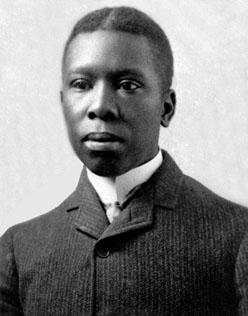
Paul Laurence Dunbar was the first African-American to gain national eminence as a poet. Born in 1872 in Dayton, Ohio, he was the son of ex-slaves and classmate to Orville Wright of aviation fame.
Although he lived to be only 33 years old, Dunbar was prolific, writing short stories, novels, librettos, plays, songs and essays as well as the poetry for which he became well known. He was popular with black and white readers of his day, and his works are celebrated today by scholars and school children alike.
His style encompasses two distinct voices -- the standard English of the classical poet and the evocative dialect of the turn-of-the-century black community in America. He was gifted in poetry -- the way that Mark Twain was in prose -- in using dialect to convey character.
Information cited from:
http://www.plethoreum.org/dunbar/

Paul Laurence Dunbar was the first African-American to gain national eminence as a poet. Born in 1872 in Dayton, Ohio, he was the son of ex-slaves and classmate to Orville Wright of aviation fame.
Although he lived to be only 33 years old, Dunbar was prolific, writing short stories, novels, librettos, plays, songs and essays as well as the poetry for which he became well known. He was popular with black and white readers of his day, and his works are celebrated today by scholars and school children alike.
His style encompasses two distinct voices -- the standard English of the classical poet and the evocative dialect of the turn-of-the-century black community in America. He was gifted in poetry -- the way that Mark Twain was in prose -- in using dialect to convey character.
Information cited from:
http://www.plethoreum.org/dunbar/
21 November 2006
17 November 2006
Alafaco Round Table Second Year
Alafaco Round Table First Year
16 November 2006
Alafaco's Thought of the Day

Thought
By D. H. Lawrence
Thought, I love thought.
But not the juggling and twisting of already existent ideas
I despise that self-important game.
Thought is the welling up of unknown life into consciousness,
Thought is the testing of statements on the touchstone of consciousness,
Thought is gazing onto the face of life, and reading what can be read,
Thought is pondering over experience, and coming to conclusion.
Thought is not a trick, or an exercise, or a set of dodges,
Thought is a man in his wholeness, wholly attending.
15 November 2006
I Hear America Singing

I hear America singing, the varied carols I hear;
Those of mechanics—each one singing his, as it should be, blithe and strong;
The carpenter singing his, as he measures his plank or beam,
The mason singing his, as he makes ready for work, or leaves off work;
The boatman singing what belongs to him in his boat—the deckhand singing on the steamboat deck;
The shoemaker singing as he sits on his bench—the hatter singing as he stands;
The wood-cutter’s song—the ploughboy’s, on his way in the morning, or at the noon intermission, or at sundown;
The delicious singing of the mother—or of the young wife at work—or of the girl sewing or washing—Each singing what belongs to her, and to none else;
The day what belongs to the day—At night, the party of young fellows, robust, friendly,
Singing, with open mouths, their strong melodious songs.
Subscribe to:
Comments (Atom)



















